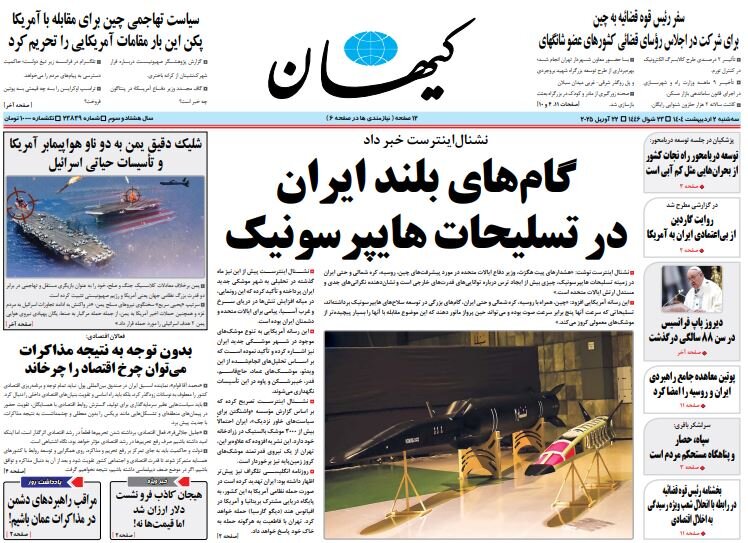Tehran-Keyhan, compiled to the need for vigilance by Iranian negotiating teams with the US in Oman, wrote:
Both our nuclear team and the US side know that the main points of disagreement are above enrichment levels, giving them an order of measures to return to guarantees and commitments to lift sanctions. However, the 60-day deadline to reach a Trump agreement and the role of mediation in Oman could lead a course of negotiations towards progress or impasse. Our experience with the JCPOA and the policies that Americans have always followed in discussion should prove that there is no way to make mistakes or mistakes in their more than 20 years of talks on the nuclear issue. Therefore, the nuclear team, particularly the team of experts scheduled to enter the details of the contract, which begins on Wednesday (April 23), should pay attention to all the words on the US side to ensure that mistakes like the JCPOA text do not repeat.
Siasat-e-Rooz: Move in the right direction
Siasat-e-Rooz dedicated an editorial to Abbas Arakich’s visit to Beijing. One of the key goals of Arakcz’s visit to China is the continued consultation and the role that China plays in nuclear negotiations. Currently, indirect negotiations are underway between Iran and the US, and several consultations with Europeans are taking place, but Tehran emphasizes never forgetting the role and status of China and Russia, and harnessing its capabilities for Western action. Iran, China and Russia are key players in the New World Order against a destructive, one-sided, one-sided order in the West. They emphasize that the world no longer requires the crisis-producing nature of capitalism and requires a new approach. To achieve this, intensive and numerous consultations is required, and Araqchi’s visit to Beijing could be a step in this direction. The United States provides evidence that it is putting together a puzzle to surround the three countries militarily, despite claims that it seeks negotiations. In these circumstances, the convergence of the three countries against this military plot appears to be an undeniable necessity.
Jam-e-Jam: Trump’s unstable actions are a major challenge in negotiations
In an interview with political analyst Dr. Seyed Mohammad Malandi, Jam debated the possibility that Trump would accept Iran’s legitimate demands in negotiations. He said: Trump’s actions and decisions in recent years have always been accompanied by instability and sudden turns. We have witnessed this instability in both trade wars and regional issues such as the Gaza Genocide. One day he issued a harsh statement regarding Iran’s nuclear activity, and the next day he was calm. It is impossible to make accurate predictions about Trump. Of course, this makes the negotiation path even more difficult. The key point is that even if an agreement is reached with the US, the certainty that the US will continue to devote its duties still comes with serious doubt. US history, coupled with Trump’s unpredictability, violates his commitment, is two factors that should not be ignored. Therefore, at this point we cannot create an accurate vision of the future of negotiations.
Farhikhtegan: Diplomacy could be a trap to justify strict measures
One of the most likely scenarios in US-Iran relations is the use of diplomatic negotiations as a trap to justify tough measures such as attacks on Iran’s nuclear facilities and regional resistance groups, particularly Yemen’s resistance groups. In this scenario, Donald Trump’s first positive statement and strategic silence are part of a plan designed to present the United States as a well-meaning negotiator. However, the main goal is to fail negotiations by making unacceptable demands and legalizing military action or new sanctions by asserting “the lack of Iran’s cooperation.” Much of the evidence supports this possibility. Military attacks on Iran could have widespread consequences, including escalating regional tensions and retaliatory attacks on US military bases. Additionally, the response of Yemen and Lebanon resistance groups could broaden the scope of conflict and impose heavy political and economic costs on the US and its allies. The history of American foreign policy shows that such strategies have been used in the past and the possibility of their repetition cannot be ignored.

